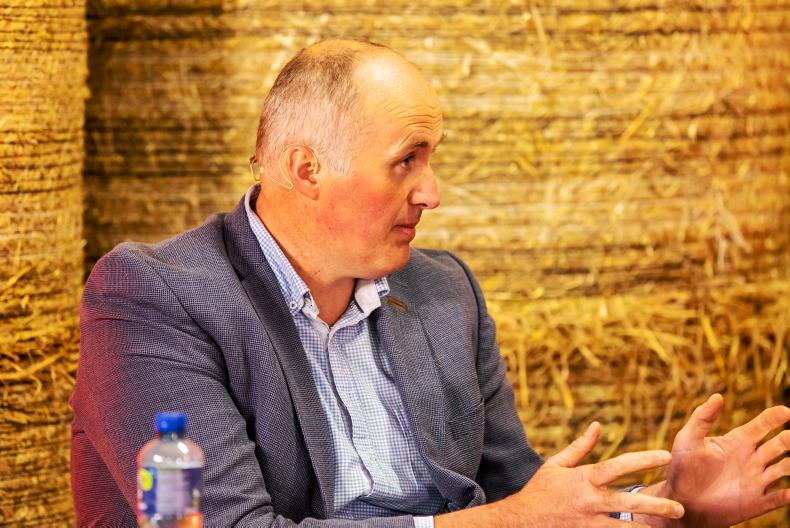The full weight of the law should be brought to bear on those responsible for a large number of dead calves discovered on a farm in Co Limerick earlier this month, says Billy Kelleher MEP.
The Fianna Fáil politician said “there should be a full criminal investigation” into the case, which is currently being investigated by the Department of Agriculture.
MEP Kelleher highlighted that “in general, welfare standards in Ireland are very high”, something he said is “accepted across Europe”, but acknowledged that “from time to time, there are breaches”.
“There should be a full criminal investigation and we do need to ensure that whatever regulations are in place are enforced and we do have obligations to ensure the highest welfare standards,” he said.
The MEP was speaking to the Irish Farmers Journal at the National Ploughing Championships this week. The Limerick calf case occurred in his Ireland South constituency.
Maintaining standards
“By maintain high welfare standards, it also benefits Irish products in the market place, because the consumer is becoming more concerned about these issues.
"Companies and supermarkets that sell products are becoming more discerning about welfare standards. So, if Ireland is to maintain its advantage in the market, we have to ensure that we have the highest welfare standards as well.
“The regulations that are there, if they were enforced right across the European Union, we mightn’t have some of the things that we’ve seen in other countries.
“There should be criminal sanctions in the event of there being a prosecution [following the Limerick calf case investigation],” Kelleher said.
No place for mistreatment
Also speaking to the Irish Farmers Journal at this week’s Ploughing, Irish Creamery Milk Suppliers Association (ICMSA) president Pat McCormack said that while he can’t comment on the individual case of the large number of dead calves on the Limerick farm, “there’s no place in agriculture for the mistreatment of animals”.

ICMSA president Pat McCormack. \ Philip Doyle
“We would have been pushing at the dairy calf stakeholder forum that more needs to be done to improve or to tighten up on any practices on a very small number of farms which would be less desirable. Animal welfare needs to be to the fore.
“What’s critical in that issue from Limerick is that it wasn’t a dairy farm that it happened on, because, in general, dairy farmers take pride in the welfare, early colostrum and to get the calves out,” he said.
Market exists
McCormack acknowledged that “in the spring of 2022, there were challenges at different times to the marketing of dairy beef calves or dairy calves, male calves”. However, he said “there was a market there and it was steady”.
“You had the shippers. For a lot of February, the shippers weren’t able to come. Hopefully, we won’t see the increase in costs erode [dairy bull calf] demand in the spring of 2023. Because that’s what we’re looking forward to it now, it’s all about 2023, next spring.
“For those guys who would have raised bull calves, Friesian in particular, over the last two years, there would have been a reward there for them,” he said.
The full weight of the law should be brought to bear on those responsible for a large number of dead calves discovered on a farm in Co Limerick earlier this month, says Billy Kelleher MEP.
The Fianna Fáil politician said “there should be a full criminal investigation” into the case, which is currently being investigated by the Department of Agriculture.
MEP Kelleher highlighted that “in general, welfare standards in Ireland are very high”, something he said is “accepted across Europe”, but acknowledged that “from time to time, there are breaches”.
“There should be a full criminal investigation and we do need to ensure that whatever regulations are in place are enforced and we do have obligations to ensure the highest welfare standards,” he said.
The MEP was speaking to the Irish Farmers Journal at the National Ploughing Championships this week. The Limerick calf case occurred in his Ireland South constituency.
Maintaining standards
“By maintain high welfare standards, it also benefits Irish products in the market place, because the consumer is becoming more concerned about these issues.
"Companies and supermarkets that sell products are becoming more discerning about welfare standards. So, if Ireland is to maintain its advantage in the market, we have to ensure that we have the highest welfare standards as well.
“The regulations that are there, if they were enforced right across the European Union, we mightn’t have some of the things that we’ve seen in other countries.
“There should be criminal sanctions in the event of there being a prosecution [following the Limerick calf case investigation],” Kelleher said.
No place for mistreatment
Also speaking to the Irish Farmers Journal at this week’s Ploughing, Irish Creamery Milk Suppliers Association (ICMSA) president Pat McCormack said that while he can’t comment on the individual case of the large number of dead calves on the Limerick farm, “there’s no place in agriculture for the mistreatment of animals”.

ICMSA president Pat McCormack. \ Philip Doyle
“We would have been pushing at the dairy calf stakeholder forum that more needs to be done to improve or to tighten up on any practices on a very small number of farms which would be less desirable. Animal welfare needs to be to the fore.
“What’s critical in that issue from Limerick is that it wasn’t a dairy farm that it happened on, because, in general, dairy farmers take pride in the welfare, early colostrum and to get the calves out,” he said.
Market exists
McCormack acknowledged that “in the spring of 2022, there were challenges at different times to the marketing of dairy beef calves or dairy calves, male calves”. However, he said “there was a market there and it was steady”.
“You had the shippers. For a lot of February, the shippers weren’t able to come. Hopefully, we won’t see the increase in costs erode [dairy bull calf] demand in the spring of 2023. Because that’s what we’re looking forward to it now, it’s all about 2023, next spring.
“For those guys who would have raised bull calves, Friesian in particular, over the last two years, there would have been a reward there for them,” he said.







 This is a subscriber-only article
This is a subscriber-only article











SHARING OPTIONS: